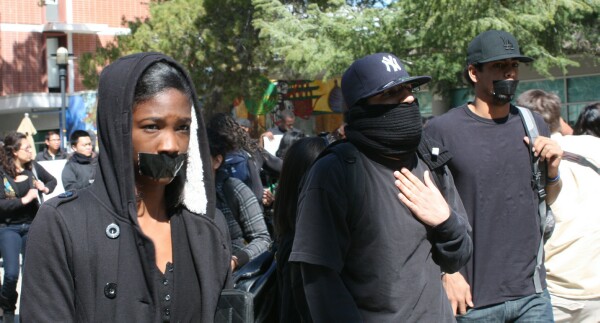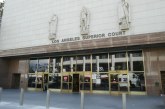
She announced her intention to declare UC Davis a hate-free campus. In announcing her proposal, she said, “It is time for our university and campus community to come together to confront head-on this sort of regrettable and reprehensible behavior, not only with words but with a coordinated set of actions.”
UC Davis it appears, regularly has used laws that are supposed to protect individuals exercising their free speech rights known as anti-SLAPP legislation, to kill civil rights lawsuits aimed at the university and assess the plaintiff’s of those lawsuits, employees of UC Davis, with large legal fees.
Most recently, the University successfully was able to dismiss a fraud claim for a discrimination lawsuit filed by Calvin Chang, a former UC Davis police officer, against the UC Regents. Although the UC Davis police chief cannot be held liable for fraud, the lawsuit will go forward against the Regents for employment and housing discrimination and retaliation. Nevertheless the UC administrators have filed a motion seeking $55,000 in legal fees against Officer Chang.
Calvin Chang joined the UC Davis police force in 2002 and became the first gay man and only Asian-American (at that time) on the force that employed fifty officers. As we have covered several times previously, he alleges that he was subjected to homophobic harassment and discrimination. He was originally reinstated by the Department after filing a complaint with the university, however, since that time more incidents have occurred.
According to the complaint, Officer Chang was subjected to a false investigation alleging that he “failed to request backup” when he “searched a laundry room at the Segundo Residence Hall.”
According to his lawsuit, the police chief then “enticed him” to settle his lawsuit, representing that the Segundo investigation “had no finding,” and that UC Police Department would agree to stop the investigation and pay him to dismiss the lawsuit.
However, the court ruled that the UC Davis Police Chief made this statement under privilege, and thus could not be held liable for fraud even if Officer Chang’s representation of the incident was accurate.
Writes Attorney Anthony Luti in his complaint:
“These government defendants misrepresented facts, in order to procure Officer Chang’s resignation by fraud, concealed records and evidence, and further continued to retaliate by committing the unlawful personnel file violations. To compound these statutory violations, defendants also breached its settlement obligations in every respect to destroy Officer Chang’s career.”
Important here is that while defendants have only been able to dismiss seven of the 17 causes of action, they are seeking nearly $55,000 in attorney’s fees. Attorney Luti in his opposition motion argues that “the amount of fees sought by the defendants is excessive and unreasonable.” He showed that the defendants were not successful defeating any of the FEHA claims, moreover they did not seek to strike several other claims including breach contract, covenant of good faith, and the POBR (PUblic Safety Officers Procedural Bill of Rights Act).
UC Davis Precedent for Use of anti-SLAPP Legislation for Civil Rights Litigation
On April 8, 2009, the Vanguard ran a story on Professor George Branner, a 72 year old professor of Electrical and Computer Engineering.
In an incident that begin over a dispute over a grade change, Professor Branner, the only African American professor in his department argued that he had “been subjected to race discrimination and harassment, and also retaliation for complaining about being improperly challenged with respect to his grades for a particular student.”
In March, students from the Black Student Union, and others were arguing that the administration and UC Davis have not produced a campus climate friendly to minority students. One of the greviences they cited was lack of African American professors and outreach to hire African American professors.
Dr. Branner represents an example of the exact problem that the students raised in their complaints. He is the only tenured African American in his department, and according to his complaint, his advancement through promotion has been relatively slow, despite the fact that he had an outstanding teaching record and a large number of publications. Professor Branner’s colleagues, most of whom were white, were promoted through the UCD faculty ladder rank step process promptly.
UC Davis officials were able to defeat all but one cause of action using anti-SLAPP legislation. For his troubles, Professor Branner has been ordered to pay more than $30,000 in legal fees.
UC Davis Response
She continued, “This is what happened in both lawsuits you reference: The court found that the claims by the plaintiffs were meritless, i.e. they fell within the definition of SLAPP. It is the responsibility of the plaintiffs’ attorneys to ensure that the lawsuit had minimal merit, and to advise their clients accordingly. Had that occurred in the lawsuits you reference, these situations would not have resulted.”
Importantly, UC Davis views the anti-SLAPP statute as nothing more than a procedural vehicle to dismiss lawsuits that they believe have no merit early in the court proceedings. “The Anti-SLAPP statute is merely a procedural vehicle to dismiss meritless lawsuits early in the court proceedings,” Ms. Morain wrote.
Moreover she cited public expense in defending such lawsuits. She aruges, “The Anti-SLAPP statute has the specific purpose of allowing defendants who are subject to meritless law suits to extricate themselves at an early juncture to save costs.”
Finally UC Davis reminds us of the public policy that motivated the legislature to enact the anti-SLAPP statute in the first place. According to their view, “The purpose of the statute is to allow persons who are performing their public duties to do so without fear that they will be sued through abuse of the judicial process.”
In fact, that view is somewhat at odds with our understanding of the history of anti-SLAPP statutes, which arose not to protect necessarily government officials from law suits involving their employees, but rather private activists speaking in opposition to powerful interests.
Strategic Lawsuits Against Public Participation (SLAPP)
According to Terry Francke, Excutive Director of Calaware, an organization that works to protect the right to free speech and open government, “Companies that had this practice took the view that this was just an intolerable interference with their business plan and so they would send these letters to people who stood up and spoke their mind and say that you are defaming us.”
“These letters,” he explained were strategic, “that’s where the word comes from, a strategic means of chilling speech, of shutting people. A very powerful and direct interference of first amendment rights.”
However, these lawsuits were also frivolous, they would not eventually stand up in court because people have the right to speak up at public meetings.
However for the people involved, the actions were ruinous. “It would be ruinously expensive for them to put on a lawyer defense so that when they “win” by getting the case dismissed, they have to sell their house.” He continued, “So it’s that practice, the combination of ruinously expensive litigation threats that became labeled as strategic lawsuits against public participation.”
Bill Lockyer, when he was in the legislature would end up carrying a bill that would provide an early shield against what seemed to be a SLAPP lawsuit. Explained Mr. Francke, “The essence is as soon as you file an action, against someone based on what they have said, either about an issue in court or another issue of genuine public interest in a public forum about anything, as soon as you do that, then the defendant who is being sued can file a motion and get the court to force the plaintiff to put on the strong points of the case to show what they have and to do that without further delay, in most cases without discovery.”
He added, “This SLAPP suit procedure has all but wiped out the defamation lawsuit.”
Unintended Consequences
In the case of Officer Calvin Chang, that would appear to be the UC Davis Police Chief allegedly misrepresenting a settlement offer. The court in that case ruled that her actions were protected and had made the statement under privilege, therefore she could not be held liable for fraud.
In the case of Professor George Branner, the Regent contend and the court agreed, that the anti-SLAPP statute, immunizes the defendant because Professor Branner complained of written and oral statements of a defamatory nature that were made before or in connection with an official proceeding authorized by the law.
In the case of Professor Branner, the plaintiff argued that this was no evidence that these were official proceedings, but it seems rather remarkable in this case that defamatory statements could conceivably be made by public officials and that they would be immunized by statutes designed to protect activists.
In the case of Officer Chang, it seems remarkable that the court allowed that an allegedly fraudulent statement by the Police Chief would still be protected and not be considered out of her official duties.
Davis Attorney Mary-Alice Coleman who represents Professor Branner in his still pending litigation against the university, argued that UC Davis is misusing the anti-SLAPP statute to thwart employees who claim civil rights violations.
She argues, “the purpose of the anti-SLAPP law is to protect an individual’s constitutional activities of free speech and to petition the government. The law is designed to prevent citizens from suffering the wrath of litigation abuse and bullying by big corporations and big government in connection with “public” issues.”
In contrast to the university’s view, Ms. Coleman argues, “This law has nothing to do with protecting persons who are performing their public duties.”
Terry Francke agrees with that sentiment. He argues that UC Davis “misses the point which is not that public agency should not have the ability to file anti-SLAPP motions or to use them to dispose of cases that are really not going to go anywhere or will be costly.”
Such use of the law would have a chilling effect on the ability of individuals to bring forward actions that challenge government actors conduct. “I think that if the only people who are entitled safely to bring an action challenging civil rights are the government’s actors themselves then that needs a lot less defense of civil rights than we’ve become accustomed to,” said Mr. Francke.
“You have to have private enforcement actions like civil rights violations, whistle blower violations, taxpayer challenges to government spending, and other areas where the government may intervene or take an enforcement role but by and large it’s left up to the injured parties or the taxpayers themselves to protect civic and civil rights in court,” he continued.
Reform Efforts and The Need For Discovery in Civil Rights Cases
As Mary Alice Coleman explained, “Civil rights claims aren’t like fender-benders. Violators don’t leave measurable skid marks or dents in metal.”
“Consequently,” she said, “civil rights abuses — such as racial discrimination — are exposed only through civil discovery and trial. The relative merit of a civil rights case simply cannot be fully assessed at the time it is filed.”
This represents a real danger when you are dealing with a government body or agency such as UC Davis.
As Mary-Alice Coleman argued, “If UC can keep all the decisions, all the participants and all the documents hidden from exposure by claiming that its actions constitute “protected activities,” the truth about these violations will never come to light.”
Reform help may be on the way. Already Senator Leland Yee has authored legislation that was signed into law this January which would prevent the imposition of attorney fees by public agencies under specific conditions.
SB 786 specifically prohibits:
“a prevailing defendant in an anti-SLAPP (Strategic Lawsuits Against Public Participation) motion from recovering attorney’s fees and costs in the following actions: 1) whenever it is made to appear by verified petition that certain public records are improperly being withheld from a member of the public; 2) specified actions involving meeting provisions of the legislative body of a local agency or a state body; or, 3) an action to obtain a judicial determination that an action taken by a legislative body of a local agency or a state body is null and void, as specified.”
Unfortunately, as Terry Francke told the Vanguard, that legislation does not apply to actions other than under the Brown Act, the California Public Records Act or the Bagley-Keene Act. And while these arguments are just as strong in the case of civil rights legislation, that will have to wait for another bill.
Senator Yee’s office told the Vanguard on Monday, that this is something that they will look into for a future bill next session. However, because deadlines have passed and their bill package is full it cannot happen this term.
Brief Commentary
That is not the intent of the SLAPP legislation and in using it in this manner, UC Davis has eroded civil rights protections that should be afforded to its employees.
If students want to understand in part why there are so few minority professors, particularly African-American professors, perhaps they ought to look at the case of now 73 year old Professor George Branner, his treatment and lack of opportunity for advancement.
The university wishes for the campus to become a hate-free zone, perhaps they ought to begin by looking at the actions of the employees that work under them. In both the case of Professor Branner and the case of Officer Calvin Chang, there appears to a good deal more that the university could have done to allow for a less hostile work environment. Until that changes, it would appear the university has very little chance of having a hate-free campus.
As is often the case, one must clean up their own practices before they point the fingers at others. Chancellor Katehi and rightly so has taken a very strong public approach to a string of hate related incidents, however, now she needs to take the same kind of public approach to dealing with the conduct of the people who work under her.
—David M. Greenwald reporting





Is it my imagination or has the new chancellor taken a very low public profile since joining UCD. Much less visible than her predecessor. And others in admin are quoted much more often rather than her. Comments?
[i]Is it my imagination or has the new chancellor taken a very low public profile since joining UCD.[/i]
It’s your imagination. The issue that really matters is the budget. On that issue, in Vanderhoef’s last year, it felt like we didn’t even have a chancellor. Katehi has a lot more to say about where the cuts will fall and why. Again, I don’t want to play her up as Lincoln crossed with Einstein. But she’s decent, much better than an old guard guy who is more than eager to retire.
As for supposedly “undermining civil rights protections”, I think David has lost track of the fact that UC Davis should try to win lawsuits filed against it, not lose them on purpose. There is a difference between protecting civil rights and taking it on the chin.
I don’t have a problem with UC Davis trying to win law suits, I have problem with exploiting a portion of the law, a loophole, for an unintended purpose. If the lawsuit has not merit or if UC Davis is correct, I hope they prevail. Using SLAPP is not appropriate however.
DPD: “I don’t have a problem with UC Davis trying to win law suits, I have problem with exploiting a portion of the law, a loophole, for an unintended purpose. If the lawsuit has not merit or if UC Davis is correct, I hope they prevail. Using SLAPP is not appropriate however.”
If a lawsuit has no merit, what differnce does it make what law is used to get a meritless lawsuit dismissed?
I tried to explain this, the university is using a loophole to argue since the actions of the UCD Police Chief and the committee in the case of Branner fell within normal procedures, that their actions are not subject to the cause of action. That’s very different from saying that the case has no merit.
DGM: “I tried to explain this, the university is using a loophole to argue since the actions of the UCD Police Chief and the committee in the case of Branner fell within normal procedures, that their actions are not subject to the cause of action. That’s very different from saying that the case has no merit.”
Sorry, but not following you here…